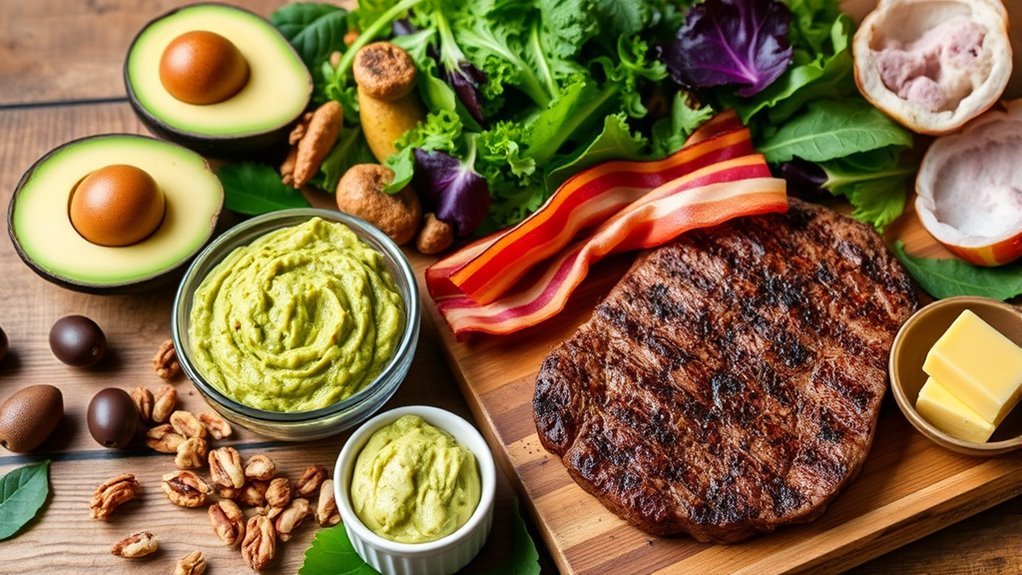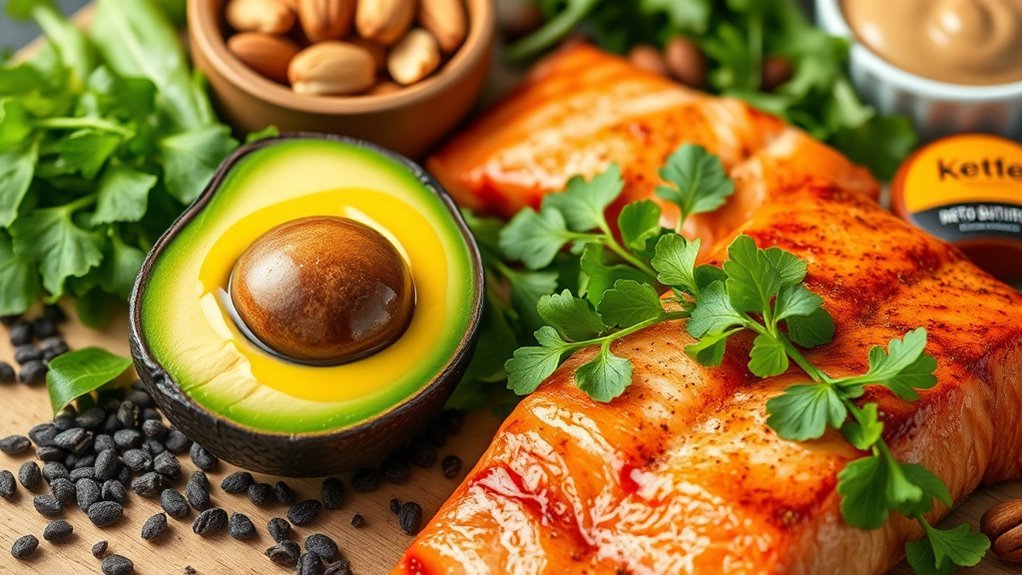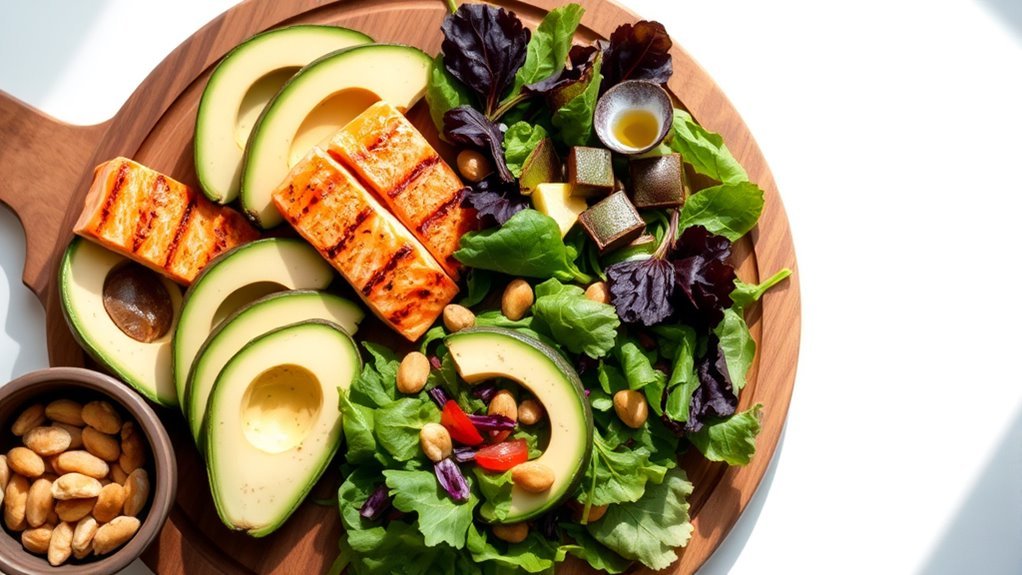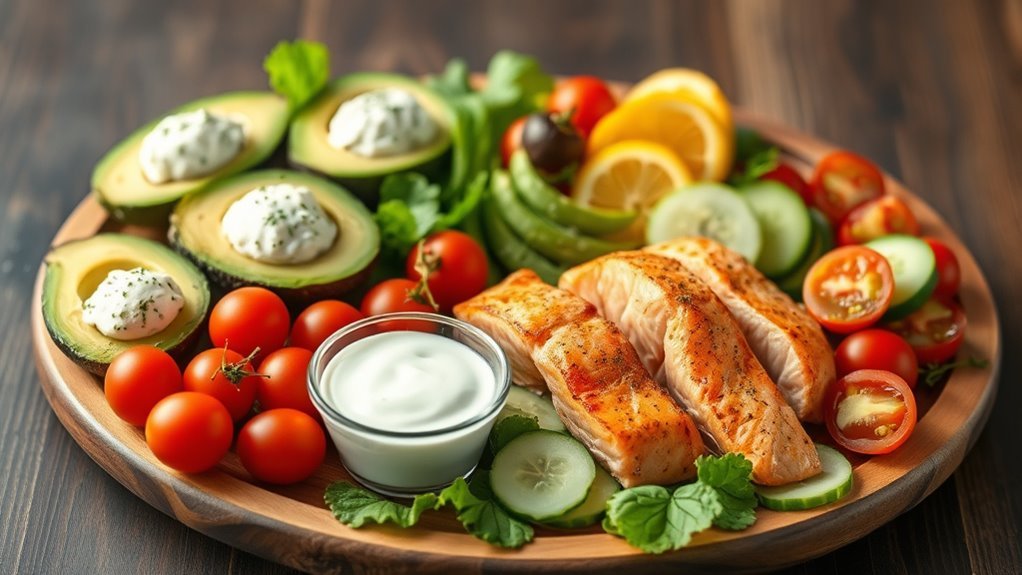On a keto diet, you should prioritize healthy fats like avocados, olive oil, and nuts, while including moderate protein sources such as lean meats, fatty fish, and eggs. Incorporate low-carb vegetables like leafy greens, broccoli, and zucchini to add nutrients. Snacking on cheese, hard-boiled eggs, or nuts can help you stay satisfied. Make sure to choose beverages like water, unsweetened tea, or coffee. There’s plenty more to discover about optimizing your keto journey.
Understanding the Ketogenic Diet

When you immerse yourself in the ketogenic diet, you’ll find it’s not just a trendy eating plan but a well-researched approach to nutrition. At its core, the ketogenic principles focus on drastically reducing carbohydrate intake while increasing healthy fats. This shift prompts your body to enter ketosis, a metabolic state where fat becomes your primary fuel source. Carb counting is essential here; it helps you stay within your daily limit, typically around 20 to 50 grams of carbs. As you embrace this lifestyle, you’ll discover a newfound freedom in food choices, prioritizing nutrient-dense options that nourish your body. Understanding these fundamentals empowers you to navigate the keto landscape confidently, making informed decisions that align with your health goals.
Healthy Fats to Include

When you’re following a keto diet, including healthy fats is essential for success. Foods like avocado, olive oil, nuts, seeds, and coconut products not only provide essential nutrients but also help keep you satiated. Let’s explore how these fats can benefit your health and support your keto journey.
Avocado and Olive Oil
Healthy fats play an essential role in the keto diet, and two standout options are avocado and olive oil. Avocados are nutrient-dense, packed with healthy monounsaturated fats, fiber, and essential vitamins, making them a great choice for boosting your overall health. The avocado benefits include promoting heart health and supporting weight management. On the other hand, olive oil types, particularly extra virgin, are rich in antioxidants and healthy fats, offering anti-inflammatory properties. Incorporating these fats into your meals not only enhances flavor but also helps you feel satisfied, allowing you the freedom to enjoy your food while staying aligned with your keto goals. So, don’t hesitate to add more avocados and olive oil to your diet!
Nuts and Seeds
Nuts and seeds are nutritional powerhouses that can greatly enhance your keto diet. Incorporating a variety of nut varieties—like almonds, walnuts, and macadamias—provides healthy fats, protein, and fiber, all while keeping your carb intake low. They’re also rich in vitamins and minerals, offering essential nutrients that support overall health.
Seeds, such as chia and flaxseeds, have unique seed benefits, including omega-3 fatty acids, which are excellent for heart health. They can also help with digestion and provide a satisfying crunch to your meals. Remember to watch portion sizes, as calories can add up quickly. By including these nutritious options, you can easily stay within your keto goals while enjoying delicious snacks and meals.
Coconut Products
Incorporating coconut products into your keto diet can be a delicious way to boost your intake of healthy fats. Coconut oil benefits include promoting heart health and enhancing your body’s fat-burning abilities. It’s perfect for cooking, baking, or adding to smoothies. You can also explore coconut flour recipes, which are low in carbs and can be used to make pancakes, bread, or even desserts. This flour is a fantastic substitute for traditional flours, allowing you to enjoy your favorite foods without compromising your keto lifestyle. Plus, coconut milk is another versatile option, great for adding creaminess to soups and curries. Embrace these coconut products to elevate your meals while supporting your health goals!
Protein Sources for a Keto Diet

When following a keto diet, choosing the right protein sources is vital for maintaining your macronutrient balance. You can opt for high-quality animal proteins like beef, chicken, and fish, which are rich in essential amino acids. If you prefer plant-based options, consider incorporating nuts, seeds, and low-carb protein powders to meet your dietary needs.
Best Animal Proteins
Animal proteins are a cornerstone of the keto diet, providing essential nutrients while keeping you in a state of ketosis. Lean meats like beef and pork are fantastic sources of protein quality, helping you meet your macros. Seafood options, particularly fatty fish like salmon, offer healthy omega-3 fatty acids. Don’t overlook organ meats; they’re nutrient-dense and can enhance your diet considerably. Explore various egg varieties, from chicken to duck, as they’re versatile and rich in nutrients. Different poultry types, such as turkey and duck, can provide diversity in your meals. Game meats, like venison or bison, are excellent choices, too. Use various cooking methods—grilling, roasting, or sautéing—to keep your meals exciting and flavorful.
Plant-Based Protein Options
While many associate the keto diet with animal proteins, there are several plant-based protein options that can fit seamlessly into your meal plan. Incorporating these alternatives can provide the freedom to explore diverse flavors while meeting your protein needs.
- Tofu Alternatives: Consider tempeh recipes; they’re packed with protein and have a nutty flavor that complements many dishes.
- Seitan Options: With its meat-like texture, seitan can be a great substitute in stir-fries or sandwiches, satisfying your cravings.
- Nutritional Yeast: Sprinkle it on salads or mix it into protein smoothies for a cheesy taste without carbs.
Be mindful of legumes concerns, but with careful planning, these plant-based proteins can enhance your keto journey.
Low-Carb Vegetables to Enjoy
Incorporating low-carb vegetables into your keto diet can greatly enhance both your meals and nutritional intake. Leafy greens like spinach and kale are excellent choices, providing essential vitamins while keeping carbs low. Cruciferous veggies such as broccoli and cauliflower can be transformed into keto-friendly salads or nutrient-dense soups, making them versatile options for any meal. Zucchini and bell peppers also offer vibrant flavors without the carb load, allowing you to enjoy a variety of dishes. Don’t forget about asparagus and mushrooms, which add depth to your meals while supporting your keto goals. By choosing these low-carb vegetables, you’ll not only diversify your diet but also stay on track with your nutritional needs. Enjoy the freedom of flavor while maintaining ketosis!
Keto-Friendly Snacks
After filling your plate with low-carb vegetables, it’s time to think about satisfying snacks that align with your keto lifestyle. Choosing the right keto snack ideas can keep your energy levels up without breaking your carb limits. Here are three quick keto bites to contemplate:
- Nuts and Seeds: A handful of almonds or sunflower seeds packs healthy fats and protein.
- Nut Butter Celery Sticks: Spread almond or peanut butter on celery for a crunchy, satisfying treat.
- Hard-Boiled Eggs: These are protein-rich and portable, making them perfect for on-the-go snacking.
With these options, you’ll find it easy to enjoy delicious snacks that support your keto journey while giving you the freedom to stay satisfied throughout the day.
Dairy Products That Fit the Keto Lifestyle
Dairy products can be a delicious and versatile addition to your keto diet, providing essential nutrients while keeping carb counts low. You’ll find plenty of options, from rich cheese varieties to creamy butter types. Check out the table below for some of the best dairy choices that align with your keto lifestyle:
| Dairy Product | Carb Count (per serving) |
|---|---|
| Cheddar Cheese | 0.4g |
| Heavy Cream | 0.4g |
| Greek Yogurt (Full Fat) | 6g |
| Unsalted Butter | 0g |
| Lactose-Free Milk | 6g |
With these high-fat dairy options, you can enjoy satisfying meals while keeping your carb intake low. Don’t forget about dairy substitutes if you’re looking for something different!
Beverages Suitable for a Keto Diet
When you’re following a keto diet, it’s important to choose beverages that align with your low-carb goals, especially since many drinks can be surprisingly high in sugar. Fortunately, there are plenty of keto-friendly drinks to enjoy without derailing your progress. Here are three great options:
Choosing the right beverages is essential on a keto diet, as many can contain hidden sugars. Explore keto-friendly options to stay on track.
- Water: Always a safe choice, and you can add lemon or lime for flavor.
- Unsweetened Tea and Coffee: Both are low in carbs and can be enjoyed hot or iced; consider adding a splash of heavy cream.
- Low Carb Smoothies: Blend spinach, avocado, and unsweetened almond milk for a nutritious, filling drink.
Meal Planning Tips for Success
To achieve success on a keto diet, effective meal planning is essential, as it helps you stay organized and focused on your low-carb goals. Start by dedicating time each week for meal prep; this can save you from impulsive eating decisions. Choose keto-friendly recipes that excite you and make a grocery list to avoid unnecessary purchases. Portion control is key—pre-portion snacks and meals to help you manage your intake and avoid overindulging. Consider prepping ingredients that can be used in multiple meals, maximizing efficiency. Finally, remain flexible; life can be unpredictable, and having a backup plan will keep you on track. With these strategies, you’ll gain the freedom to enjoy your keto journey while maintaining your health goals.
Frequently Asked Questions about the Keto Diet
1. What foods are allowed on a keto diet?
On a keto diet, you should focus on high-fat, low-carbohydrate foods. This includes meats (such as beef, pork, and chicken), fatty fish (like salmon and sardines), eggs, low-carb vegetables (such as leafy greens, broccoli, and cauliflower), nuts and seeds, healthy fats (like olive oil, coconut oil, and avocado), and dairy products (preferably full-fat). Avoid grains, sugars, and most fruits to maintain ketosis.
2. Can I eat fruits on a keto diet?
While most fruits are high in sugar and therefore avoided on a keto diet, you can enjoy small portions of low-sugar fruits. Berries, such as strawberries, raspberries, and blackberries, are typically lower in carbs and can be consumed in moderation. Avocado is also considered a fruit and is highly encouraged due to its high fat content and low carbohydrate count.
3. What should I drink on a keto diet?
On a keto diet, the best beverages include water, sparkling water, and herbal teas. Black coffee and unsweetened tea are also acceptable. It’s important to avoid sugary drinks, fruit juices, and sweetened beverages, as they can interfere with ketosis. If you prefer flavored drinks, consider adding a slice of lemon or lime to your water or trying electrolyte drinks without added sugars.
4. How do I ensure I’m getting enough nutrients on a keto diet?
To ensure you’re getting enough nutrients on a keto diet, it’s essential to include a variety of low-carb vegetables, healthy fats, and protein sources in your meals. Incorporate leafy greens, cruciferous vegetables, and colorful veggies to provide vitamins and minerals. You may also consider taking a multivitamin or specific supplements (like magnesium, potassium, or omega-3 fatty acids) to fill any gaps in your nutrition. Consulting with a healthcare professional or a registered dietitian can help tailor your diet for optimal health.
5. Can I eat dairy on a keto diet?
Yes, dairy can be included in a keto diet, especially full-fat options. Foods such as cheese, heavy cream, and full-fat yogurt are good sources of fat and protein while being low in carbohydrates. However, some individuals may be lactose intolerant or sensitive to dairy, so it’s important to listen to your body and choose dairy products that fit your dietary needs. Always check labels for added sugars and carbs.
References
- https://www.ncbi.nlm.nih.gov/pmc/articles/PMC6026220/
- https://www.healthline.com/nutrition/what-is-the-keto-diet
- https://www.mayoclinic.org/healthy-lifestyle/nutrition-and-healthy-eating/in-depth/keto-diet/art-20459848
- https://www.hhs.gov/fitness/eat-healthy/nutrition.html
- https://www.cdc.gov/healthyweight/healthy_eating/index.html
- https://www.webmd.com/diet/what-is-the-keto-diet
- https://www.medicalnewstoday.com/articles/321302
- https://www.washingtonpost.com/food/2020/10/07/keto-diet-foods/


